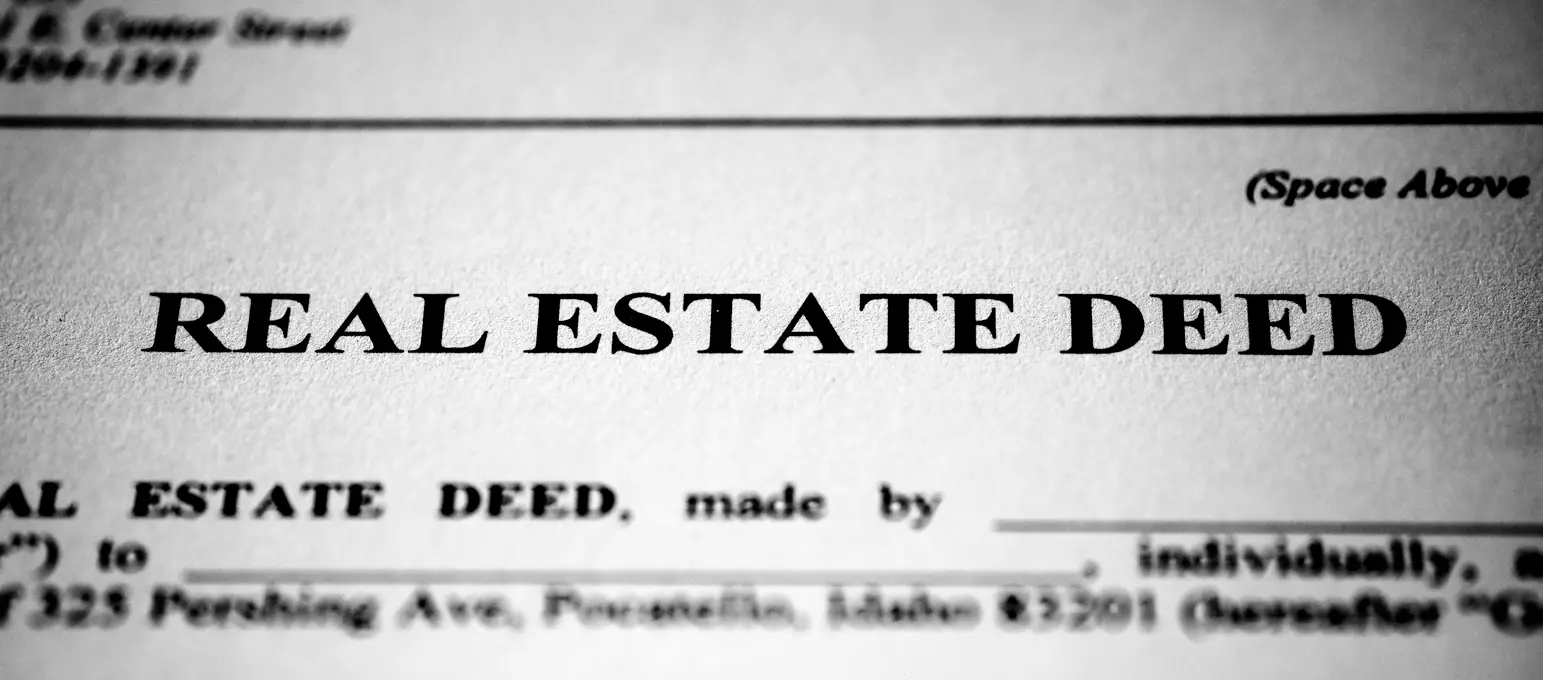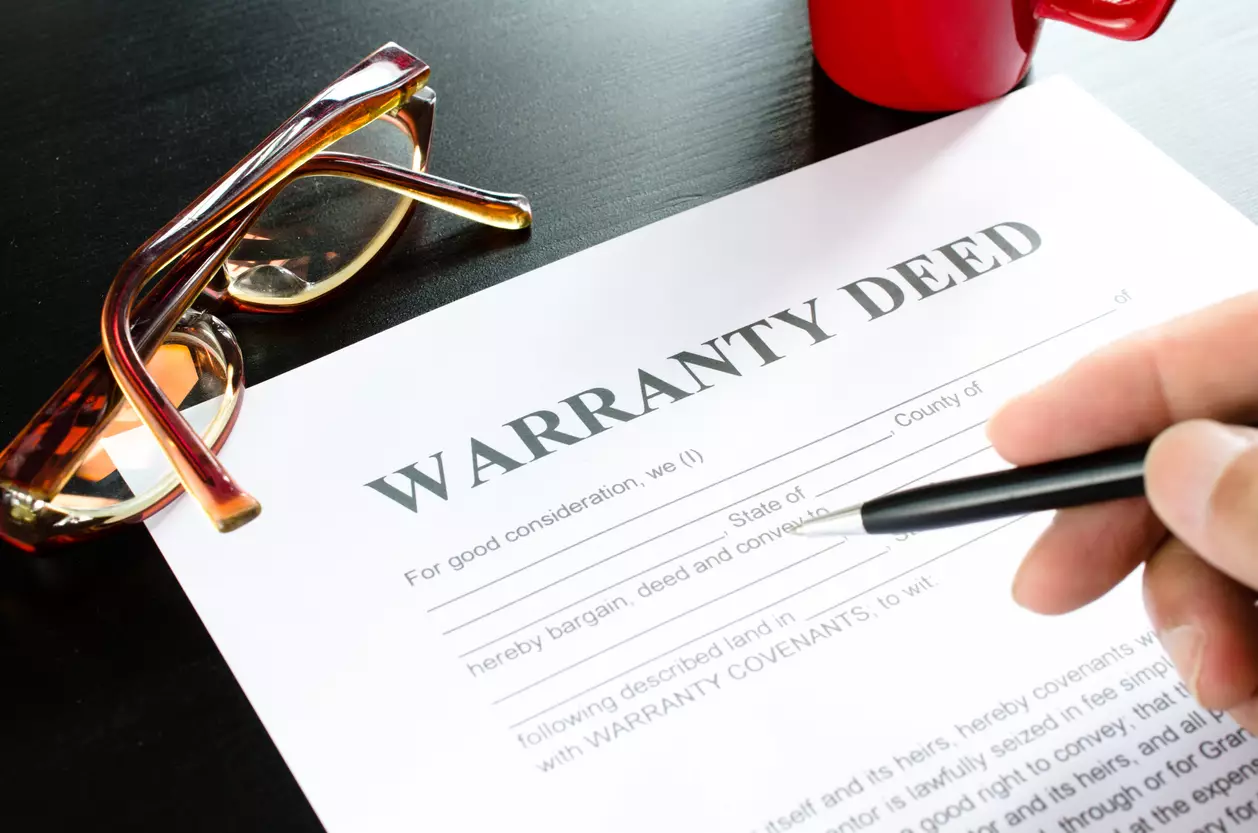Does Having Your Name On the Deed Mean You Own The Property?

Table of Contents
- Does Having Your Name On the Deed Mean You Own The Property?
- What Are My Rights If My Name Is On The Deed?
- Can Someone Unlisted On The Deed Claim Ownership Of The Property?
- How Do California Property Deeds Compare To Other States?
- What If My Name Is On The Mortgage But Not The Deed?
- What If My Name Is On The Deed But Not The Mortgage?
- What Happens To Property Ownership After Death?
- How To Remove Someone From a Property Deed
- Things To Consider When Buying Or Inheriting A Property
- How A Real Estate Attorney Can Help With Property Deeds
- Areas We Serve in California: Expert Help In Property Deeds
Buying a home with your significant other can be a life-changing experience for the better or trigger a cycle of unresolved trauma. There are so many documents to analyze and sign that it can be staggering at times. The two most important factors are the deed to the property and any details of a mortgage.
A deed is a legal and physical document proving the transfer of ownership from one person (grantor) to another (grantee) for material possession of a specific piece of property. The deed provides a precise description of the property, including its location and boundaries. Specific language is created to transfer ownership from the grantor to the grantee formally.
A mortgage (loan) is used to purchase the property, and those persons who signed the documentation are legally obligated to repay the lender. The complexities of life provide countless variations on how mortgages are affected by marriage and death. During marriage, there is joint and sole ownership and community property. After death, there may be inheriting the home or a loan assumption.
California is one of nine states that is community property, meaning assets and debts acquired during a marriage are considered to be owned by both husband and wife. All other states are common law, where assets and debts are owned by the spouse who acquired them.
What Are My Rights If My Name Is On The Deed?
If your name appears on a property deed, you possess several key rights, subject to any shared property agreements or legal conditions.
- If your name is on the deed, you have the right of possession, meaning the right to possess and occupy a property.
- A property owner has the right of disposition, which is the ability to sell, rent, or transfer ownership.
- The right of control and enjoyment is given to the property owner, meaning the ability to enjoy and control property as one sees fit within legal boundaries.
- Property owners are given the right of exclusion or the ability to determine who may enter.
- The right to home equity gives property owners the value of the home less what is owed.
There are important considerations property owners should be aware of if their name appears on the deed. 1) Ownership structure, such as sole proprietor, joint tenancy, or tenancy in common, lays out specific ownership rights based on the ownership framework. 2) Even though the owner has a right to sell, it is based on other considerations, such as any mortgages or liens tied to the property. Legal considerations from the local or federal government may impact a property owner’s rights.
Property owners are responsible for paying any state or federal taxes that may be due. Maintenance and upkeep of a home or land is also the property owner’s obligation. If the property is rented generally, a tenant is involved in the maintenance.
Can Someone Unlisted On The Deed Claim Ownership Of The Property?
In a community property state, such as California, if a couple acquired a home while married, the value is shared by both, even though your name is not on the deed. The communal property law prevents one spouse from losing a home because of divorce. During divorce proceedings, the court will look at the contributions of both spouses when dividing property.
The outcome of any separation or divorce will depend on when the home and any other assets were acquired. The only time a court would have the authority over property rights in a divorce case is by providing support for minor children.
Adverse possession or squatter's rights” is a legal doctrine where a person can claim ownership of a property based on continuous possession without the permission of the valid owner.
A squatter must demonstrate the following:
- The possession of the property is open to the owner and media.
- Possession must be uninterrupted for a specific amount of time, based on the state authority. In California, the statutory period is five years. Possession must be without the authority of the actual owner.
- Squatters must use the land as if it were their own.
Couples living together have no rights to each other’s property unless there is a cohabitation agreement. This agreement can be implied or written. The property rights of two people living together are irrelevant, and the obligation to each other is in the contract only.
How Do California Property Deeds Compare To Other States?
It is vitally important for couples planning on getting married to understand the community property laws of California. There are two core property deeds used in California to transfer title.
- A grant deed signifies that the seller has not previously encumbered or conveyed the property and no deed problems arose during their ownership. California property lenders and title companies require this type of deed.
- Quitclaim deeds transfer ownership but without warranties or title guarantees. A quitclaim does not guarantee ownership transfer. Quitclaim deeds offer the least amount of property guarantees to the buyer.
California joint tenancy allows equal ownership of a property with the right of survivorship, meaning the surviving spouse inherits the ownership.
Transferring ownership in California real estate is similar to that in other states, including non-community. Once an agreement has been signed, the lender begins to prepare the deed with all the necessary information, including the principles, description, and incidental conditions. A title search is carried out, and the escrow account is opened.
The grantor signs the prepared deed in the presence of a notary, and then the document is delivered to the buyer for their signature and notarization. An executed deed is delivered to the county recorder’s office to establish the buyer’s legal ownership. All transfer fees and taxes are paid, the designated escrow company releases funds, and the title ownership is formally transferred.
What If My Name Is On The Mortgage But Not The Deed?
A California mortgage (loan) and deed are two independent legal conditions that are often related but not required for each other. However, this circumstance can lead to a few bizarre complications.
A mortgage is an agreement with a lender, and a deed proves ownership in real estate. Any names on a mortgage document mean those persons are obligated to repay the loan, regardless of whether the name is on the deed. Names on a deed have all ownership rights, including property control.
Never enter into a mortgage contract or property purchase without having a capable real estate attorney on retainer. Property ownership is a complex and tricky affair, especially when multiple signatures are needed to complete the transaction.
Different names on deeds and mortgages can lead to complications, most notably with inheritance issues, a partner dies, or when the mortgage owner defaults. For example, a home has the signature of just the husband on the deed in a non-community state. However, the mortgage has the husband and wife’s name, and the husband dies suddenly. It is possible the wife is left with the mortgage but no home. These potential hardships can be countered with preparation and a good attorney.
What If My Name Is On The Deed But Not The Mortgage?
If your name is the only signature on the deed and not on the mortgage, you are legally considered an owner with the accompanying rights. You may not be obligated to repay the loan; however, the property is still collateral on the mortgage regardless of signatures on the deed.
Timing considerations have an impact on repayment. For example, if your name was added after the mortgage was created, each signature on the loan is liable. If your name was on the deed prior to mortgage creation, theoretically, the bank can only foreclose on a portion of the home, practical applications aside. The possibilities are intriguing.
Real estate attorneys can unravel unique situations of foreclosure risk, obligation, and property ownership.
What Happens To Property Ownership After Death?
The inevitability of death makes it vital for every property owner to plan for this final consequence of life. If a family has considerable assets, the most efficient transfer alternative is a family trust. In simple terms, the trust is set up to transfer assets to another family member when a part of the family dies. A well-managed trust avoids probate courts.
Each state controls how the trust is created and managed. For example, in several states, a trust cannot be made for assets worth less than $36,000. California has developed its website for estate management.
There are a few ways real estate can be transferred, including a will, probate ownership, or a right of survivorship. Inheritance is a significant form of conflict among a family when dealing with multiple properties and family members. Heirs to a property are determined by the state, and upon a family member’s death, real estate is transferred, bypassing probate.
- With a Will (testate), A will outlines how the division of assets are distributed once a person dies. The probate court oversees this process, making sure the assets and debts are distributed correctly, and the proper transfer of title is carried out.
- Without a will (intestate), debts and assets are distributed according to the state's intestacy laws. California prioritizes spouses and children over other family members. If no family can be found, all assets and real estate are passed to the state.
- Deeds are created with joint ownership, such as Joint Tenancy with survivor's rights and tenancy in Common. These two property distribution protocols are a means to bypass probate courts.
Probate is a specialized court and process that is tasked with dealing with the division of assets and debts according to state laws. Each state has its interpretation of probate laws, such as California’s 30-day deadline to file. A deceased person's property and debt are not required to pass through probate if a well-designed will and inheritance document is created and notarized.
How To Remove Someone From a Property Deed
Removing a person’s name from a real estate deed usually involves a major life change, such as death or divorce. Deeds represent an owner’s right to the property, while a title is the ultimate ownership document of the property. In most states, a deed is used to make changes to the title. A new deed must be created to remove a person’s name from the original deed.
Consent is the key to removing a person’s name from the deed. A new quitclaim or warranty deed is sufficient to make the change. Removing a name without their knowledge is usually met with a felony fraud or forgery action with exceptions such as a court order.
- As stated earlier in this article, a capable real estate attorney is invaluable in this situation. Once consent is given to the surviving owner, a current copy of the deed should be on hand to determine spelling and exact naming convention.
- Make sure to have an acknowledgment and consent form signed by the parties involved.
- Sign and notarize the new deed and record the document at the registrar’s office.
A Deed Of Relinquishment may be required by the state and is used to transfer ownership rights from one person to another. This form is mainly used in family situations.
Things To Consider When Buying Or Inheriting A Property
Depending on the property, there can be a multitude of documents and statements to analyze and sign. Buying a home is an emotional and highly charged affair for each member of the family. Ironically, emotion should be the last consideration.
- Budget and down payments should be the first consideration. However, if this is the first time to purchase a home, get qualified advice on the costs involved, not just the down payment.
- Seek out every mortgage option available without making a choice early on in the process. There are FHA, VA, and conventional options to consider, such as fixed 30 years or longer, variable rate mortgages, balloon notes, and so on.
- Compare property taxes on each area of interest, as these costs can significantly impact long-term costs.
- Factor in maintenance and upkeep, both long and short-term costs. Do not forget any planned upgrades and future development plans.
- Make sure to consider any potential age-related costs, including HVAC, new windows and doors, and floors, and do not forget a new roof.
Inheriting a property comes with its own set of challenges, such as tax consequences and lifestyle changes. If inheriting a home is on the horizon, assess the property's condition and make a decision on whether to keep the house or sell. If selling for a profit is in the cards, do it immediately.
How A Real Estate Attorney Can Help With Property Deeds
Throughout this article, the prevailing advice has been to consult a real estate attorney representing your interests first. Do not retain the first law firm that approaches your situation. Many attorneys are simply chasers with no consideration but stealing your money.

Represented processes, title searches, and document reviews by an attorney are required by law in most states. From a practical standpoint, there are too many factors to consider in each transaction; a person without the proper knowledge and certification cannot possibly complete a skilled transfer of title.
A capable real estate attorney understands the many legal rights to control a piece of property and how to transfer ownership. Attorneys conduct a title search to look for liens and encumbrances before a transaction to resolve claims.
A well-researched legal office prepares the large number of documents required for every transaction. Documents include the purchase agreement, deeds and transfer notices, mortgage agreements, and closing documentation.
The client's position is represented at closing, ensuring documents are signed correctly and in the proper legal manner. Your attorney makes certain all state and federal laws are followed. including disclosures and zoning laws.
A capable real estate attorney may be the most crucial decision a buyer can make during the purchasing process.
Areas We Serve in California: Expert Help In Property Deeds
Each area in California is one of diversity and community involvement. As a Real Estate Services company, we seek to empower anyone who avails themselves of our company values.
Our expertise is in handling every aspect of deed services, backed by decades of experience in the area. We look forward to serving you!
Search Property & Deed Records
Table of Contents
- Does Having Your Name On the Deed Mean You Own The Property?
- What Are My Rights If My Name Is On The Deed?
- Can Someone Unlisted On The Deed Claim Ownership Of The Property?
- How Do California Property Deeds Compare To Other States?
- What If My Name Is On The Mortgage But Not The Deed?
- What If My Name Is On The Deed But Not The Mortgage?
- What Happens To Property Ownership After Death?
- How To Remove Someone From a Property Deed
- Things To Consider When Buying Or Inheriting A Property
- How A Real Estate Attorney Can Help With Property Deeds
- Areas We Serve in California: Expert Help In Property Deeds










